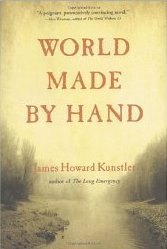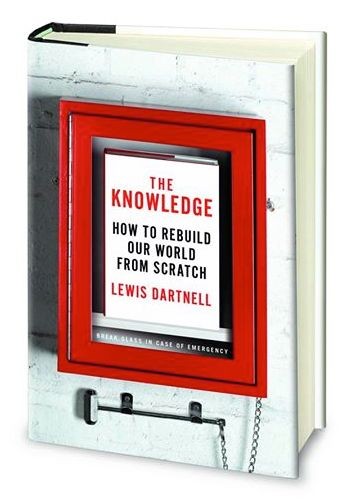World Made by Hand
Although it’s been out for a little whi le now, I’ve only just stumbled across and read James Howard Kunstler’s novel World Made by Hand, after it was recommended by a visitor to this website. Kunstler wrote The Long Emergency: Surviving the Converging Catastrophes of the 21st Century, an analysis of the likely societal effects as we reach depletion of fossil fuels, and has been thinking long and hard about the challenges of a post-oil future.
le now, I’ve only just stumbled across and read James Howard Kunstler’s novel World Made by Hand, after it was recommended by a visitor to this website. Kunstler wrote The Long Emergency: Surviving the Converging Catastrophes of the 21st Century, an analysis of the likely societal effects as we reach depletion of fossil fuels, and has been thinking long and hard about the challenges of a post-oil future.
‘World Made by Hand’ is the first book in a series of novels set in a post-apocalyptic world, beginning an unspecified number of decades after collapse. The majority of humanity has succumbed to a combo-whammy of terrorist nuclear bombs devastating major US cities, global pandemics, resource wars and climate change. Small surviving communities have regressed to simpler means, living off locally-grown food and relearning skills of self-sufficiency and home production – the central character was once a business executive but now plies his trade as a carpenter.
This scenario, after the end of the machine age, obviously echoes many of the topics discussed in The Knowledge. The backdrop of ‘World Made by Hand’ is the steady dilapidation of abandonned buildings and the re-wilding of parking lots. The survivors salvage what they can from the ruins, process biofuels to keep a few key engines running, and burn limestone to make cement for rebuilding. One character smokes fish in an old refrigerator (the defunct technology being subverted to a new function for preservation). The town doctor distills his own grain alcohol to use for antiseptic and his trying to re-develop the method to refine morphine from poppy sap. No less profound are the lifestyle changes that would be forced by the disappearance of globalised trade. Although bicycles are a mechanically simple means of transport, they’d become highly impractical once the rubber supply is cut off. You’d also need to get used to a diet without coffee, black pepper or cinnamon, or anything that is imported by long-distance trade.
Some elements of ‘World Made by Hand’ do strike me as unlikely. For example, why would people only keep radio stations running to preach, and not to broadcast music or news updates? I’d also debate the inevitability of the ‘egalitarian pretences of the high-octane decades’ dissolving away to relegate women to subservient roles. Occasionally, the characters feel like mouthpieces for Kunstler’s own idealisations, proselytising that people would be better off following natural cycles, eating “real food instead of processed crap full of chemicals. We’re not jacked up on coffee and television and sexy advertising all the time”. But these are small niggles with an otherwise engaging story and impressively realistic effort at post-apocalyptic world-building. Do give World Made by Hand a read!

